Essay on Engels' Historical Materialism & Capitalism: AP/SOSC1140
VerifiedAdded on 2023/05/31
|6
|1178
|114
Essay
AI Summary
This essay delves into Friedrich Engels' historical materialism, particularly his critique of capitalism as presented in "Anti-Dühring." It explains Engels' understanding of historical materialism, highlighting the inherent contradictions within the capitalist mode of production. The essay further elaborates on two key contradictions arising from this fundamental conflict: the disparity between organized production in factories and the anarchy of production in society, and the rebellion of productive forces against outdated modes of production. The analysis underscores the Marxist perspective on the societal impact of capitalism and the importance of considering socialist and communist alternatives for a more equitable society. This document is available on Desklib, a platform offering a range of study tools and solved assignments for students.
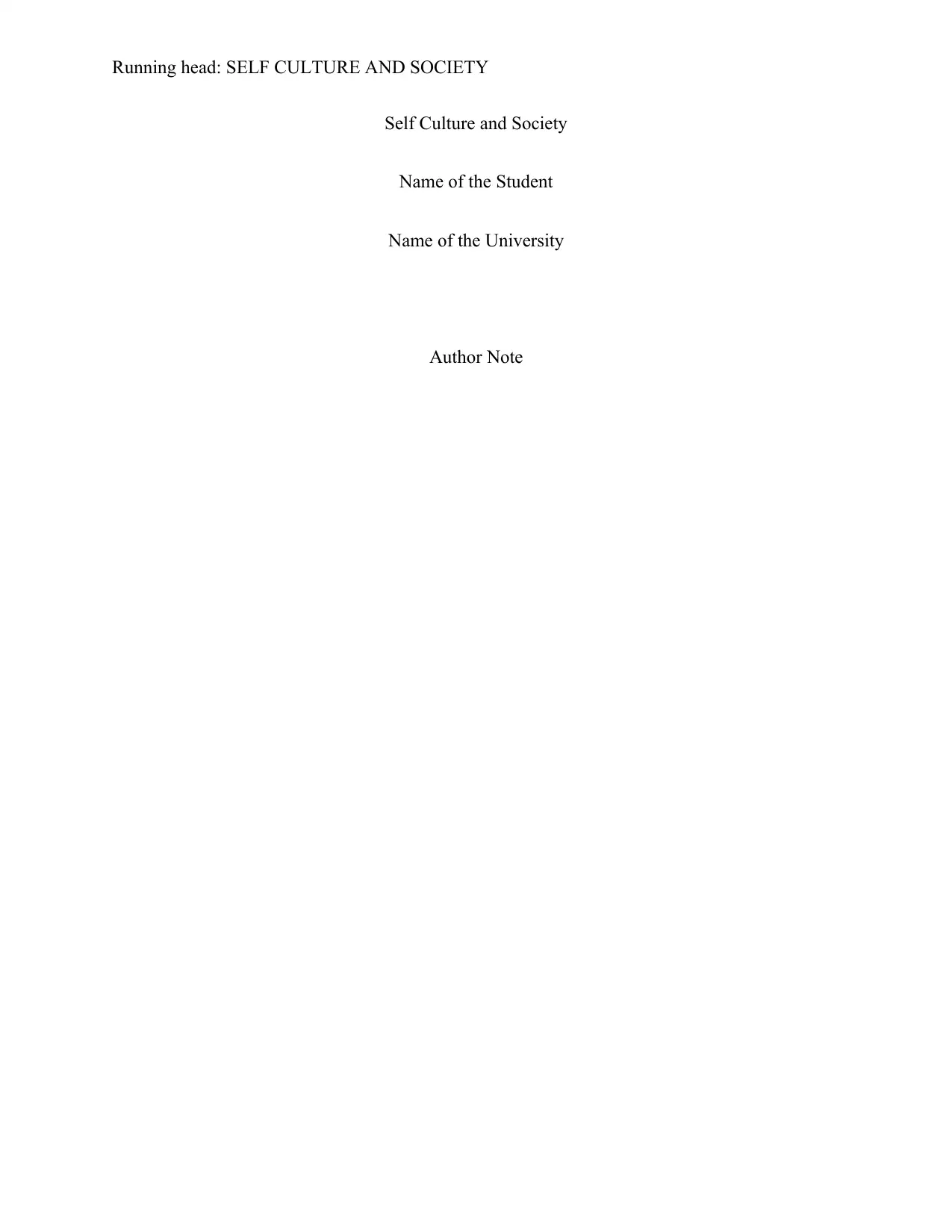
Running head: SELF CULTURE AND SOCIETY
Self Culture and Society
Name of the Student
Name of the University
Author Note
Self Culture and Society
Name of the Student
Name of the University
Author Note
Paraphrase This Document
Need a fresh take? Get an instant paraphrase of this document with our AI Paraphraser
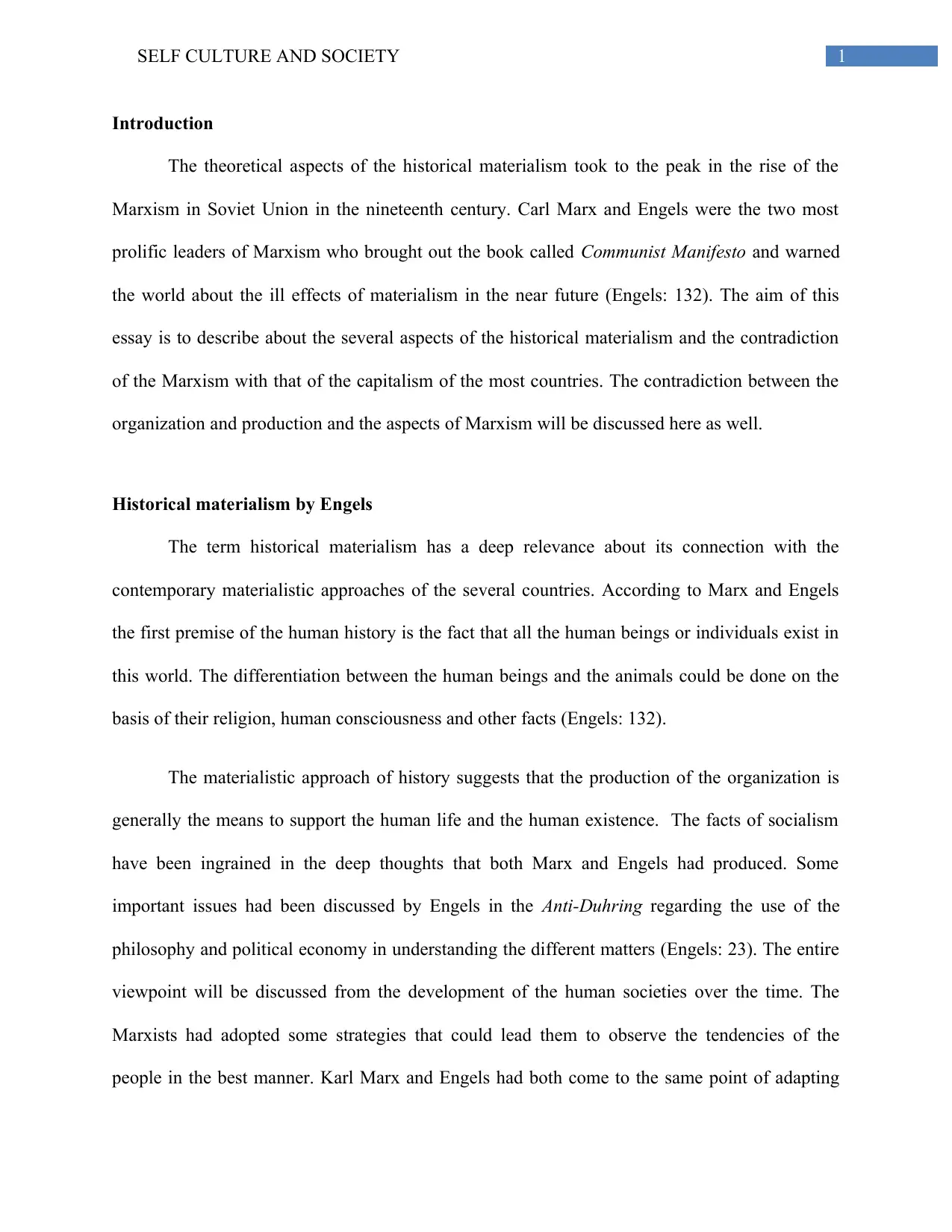
1SELF CULTURE AND SOCIETY
Introduction
The theoretical aspects of the historical materialism took to the peak in the rise of the
Marxism in Soviet Union in the nineteenth century. Carl Marx and Engels were the two most
prolific leaders of Marxism who brought out the book called Communist Manifesto and warned
the world about the ill effects of materialism in the near future (Engels: 132). The aim of this
essay is to describe about the several aspects of the historical materialism and the contradiction
of the Marxism with that of the capitalism of the most countries. The contradiction between the
organization and production and the aspects of Marxism will be discussed here as well.
Historical materialism by Engels
The term historical materialism has a deep relevance about its connection with the
contemporary materialistic approaches of the several countries. According to Marx and Engels
the first premise of the human history is the fact that all the human beings or individuals exist in
this world. The differentiation between the human beings and the animals could be done on the
basis of their religion, human consciousness and other facts (Engels: 132).
The materialistic approach of history suggests that the production of the organization is
generally the means to support the human life and the human existence. The facts of socialism
have been ingrained in the deep thoughts that both Marx and Engels had produced. Some
important issues had been discussed by Engels in the Anti-Duhring regarding the use of the
philosophy and political economy in understanding the different matters (Engels: 23). The entire
viewpoint will be discussed from the development of the human societies over the time. The
Marxists had adopted some strategies that could lead them to observe the tendencies of the
people in the best manner. Karl Marx and Engels had both come to the same point of adapting
Introduction
The theoretical aspects of the historical materialism took to the peak in the rise of the
Marxism in Soviet Union in the nineteenth century. Carl Marx and Engels were the two most
prolific leaders of Marxism who brought out the book called Communist Manifesto and warned
the world about the ill effects of materialism in the near future (Engels: 132). The aim of this
essay is to describe about the several aspects of the historical materialism and the contradiction
of the Marxism with that of the capitalism of the most countries. The contradiction between the
organization and production and the aspects of Marxism will be discussed here as well.
Historical materialism by Engels
The term historical materialism has a deep relevance about its connection with the
contemporary materialistic approaches of the several countries. According to Marx and Engels
the first premise of the human history is the fact that all the human beings or individuals exist in
this world. The differentiation between the human beings and the animals could be done on the
basis of their religion, human consciousness and other facts (Engels: 132).
The materialistic approach of history suggests that the production of the organization is
generally the means to support the human life and the human existence. The facts of socialism
have been ingrained in the deep thoughts that both Marx and Engels had produced. Some
important issues had been discussed by Engels in the Anti-Duhring regarding the use of the
philosophy and political economy in understanding the different matters (Engels: 23). The entire
viewpoint will be discussed from the development of the human societies over the time. The
Marxists had adopted some strategies that could lead them to observe the tendencies of the
people in the best manner. Karl Marx and Engels had both come to the same point of adapting
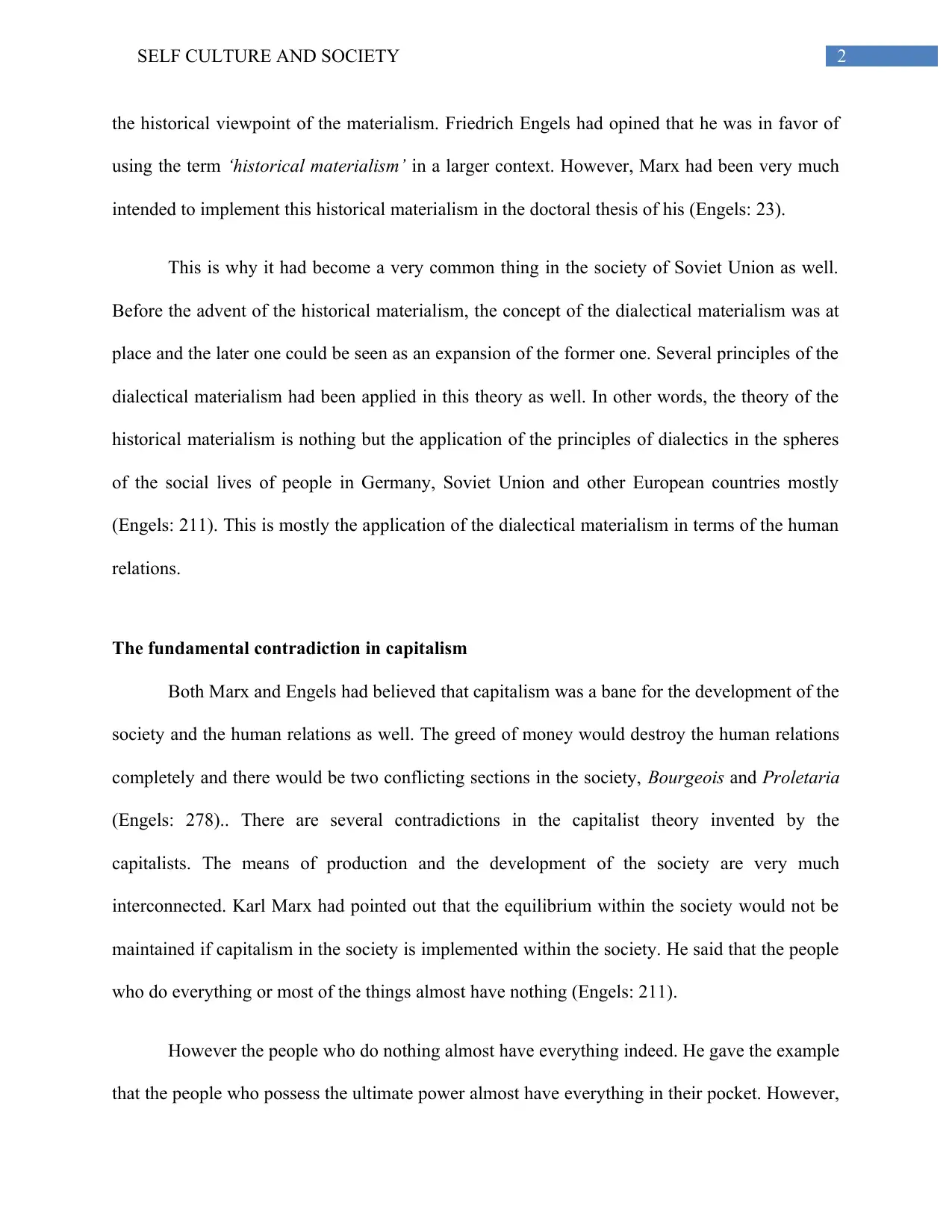
2SELF CULTURE AND SOCIETY
the historical viewpoint of the materialism. Friedrich Engels had opined that he was in favor of
using the term ‘historical materialism’ in a larger context. However, Marx had been very much
intended to implement this historical materialism in the doctoral thesis of his (Engels: 23).
This is why it had become a very common thing in the society of Soviet Union as well.
Before the advent of the historical materialism, the concept of the dialectical materialism was at
place and the later one could be seen as an expansion of the former one. Several principles of the
dialectical materialism had been applied in this theory as well. In other words, the theory of the
historical materialism is nothing but the application of the principles of dialectics in the spheres
of the social lives of people in Germany, Soviet Union and other European countries mostly
(Engels: 211). This is mostly the application of the dialectical materialism in terms of the human
relations.
The fundamental contradiction in capitalism
Both Marx and Engels had believed that capitalism was a bane for the development of the
society and the human relations as well. The greed of money would destroy the human relations
completely and there would be two conflicting sections in the society, Bourgeois and Proletaria
(Engels: 278).. There are several contradictions in the capitalist theory invented by the
capitalists. The means of production and the development of the society are very much
interconnected. Karl Marx had pointed out that the equilibrium within the society would not be
maintained if capitalism in the society is implemented within the society. He said that the people
who do everything or most of the things almost have nothing (Engels: 211).
However the people who do nothing almost have everything indeed. He gave the example
that the people who possess the ultimate power almost have everything in their pocket. However,
the historical viewpoint of the materialism. Friedrich Engels had opined that he was in favor of
using the term ‘historical materialism’ in a larger context. However, Marx had been very much
intended to implement this historical materialism in the doctoral thesis of his (Engels: 23).
This is why it had become a very common thing in the society of Soviet Union as well.
Before the advent of the historical materialism, the concept of the dialectical materialism was at
place and the later one could be seen as an expansion of the former one. Several principles of the
dialectical materialism had been applied in this theory as well. In other words, the theory of the
historical materialism is nothing but the application of the principles of dialectics in the spheres
of the social lives of people in Germany, Soviet Union and other European countries mostly
(Engels: 211). This is mostly the application of the dialectical materialism in terms of the human
relations.
The fundamental contradiction in capitalism
Both Marx and Engels had believed that capitalism was a bane for the development of the
society and the human relations as well. The greed of money would destroy the human relations
completely and there would be two conflicting sections in the society, Bourgeois and Proletaria
(Engels: 278).. There are several contradictions in the capitalist theory invented by the
capitalists. The means of production and the development of the society are very much
interconnected. Karl Marx had pointed out that the equilibrium within the society would not be
maintained if capitalism in the society is implemented within the society. He said that the people
who do everything or most of the things almost have nothing (Engels: 211).
However the people who do nothing almost have everything indeed. He gave the example
that the people who possess the ultimate power almost have everything in their pocket. However,
⊘ This is a preview!⊘
Do you want full access?
Subscribe today to unlock all pages.

Trusted by 1+ million students worldwide
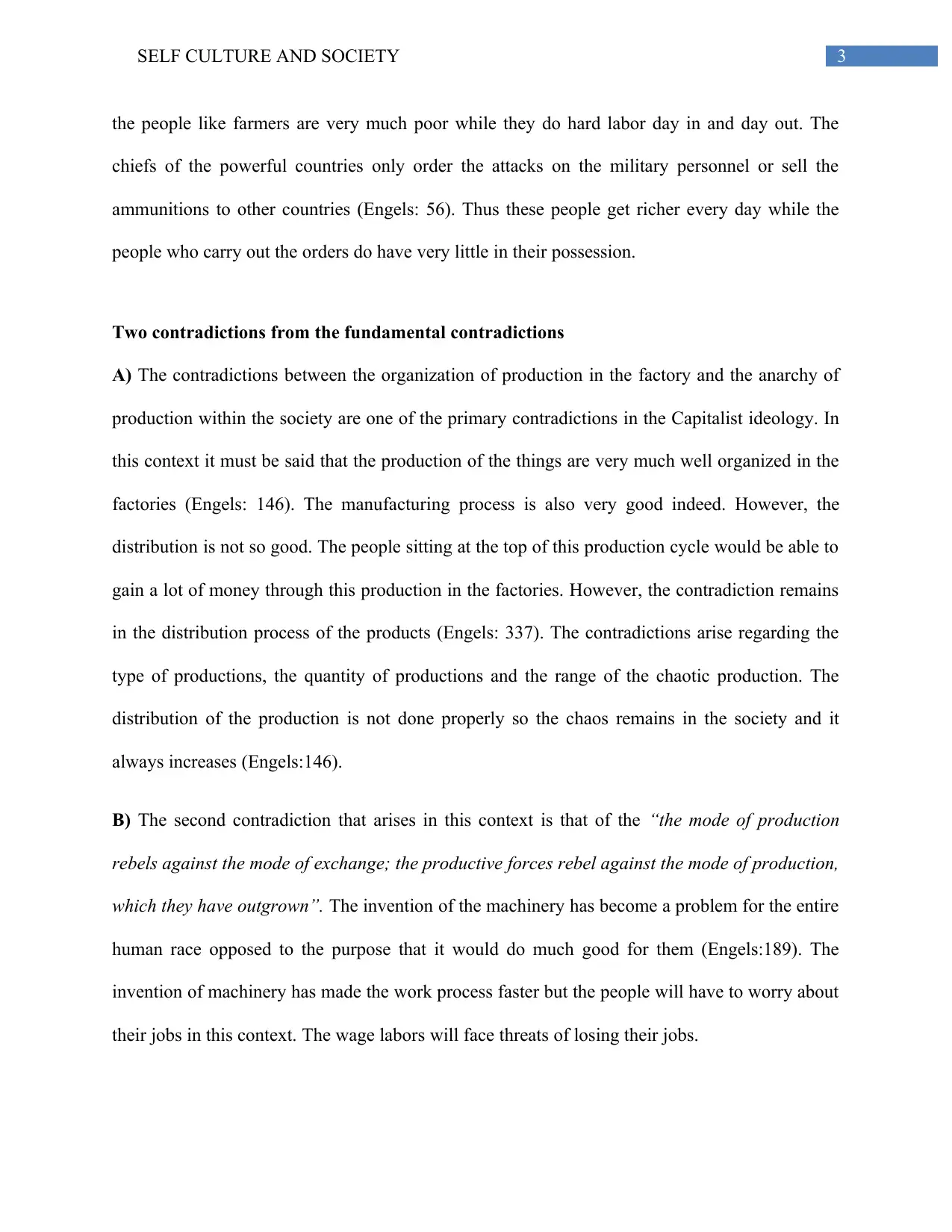
3SELF CULTURE AND SOCIETY
the people like farmers are very much poor while they do hard labor day in and day out. The
chiefs of the powerful countries only order the attacks on the military personnel or sell the
ammunitions to other countries (Engels: 56). Thus these people get richer every day while the
people who carry out the orders do have very little in their possession.
Two contradictions from the fundamental contradictions
A) The contradictions between the organization of production in the factory and the anarchy of
production within the society are one of the primary contradictions in the Capitalist ideology. In
this context it must be said that the production of the things are very much well organized in the
factories (Engels: 146). The manufacturing process is also very good indeed. However, the
distribution is not so good. The people sitting at the top of this production cycle would be able to
gain a lot of money through this production in the factories. However, the contradiction remains
in the distribution process of the products (Engels: 337). The contradictions arise regarding the
type of productions, the quantity of productions and the range of the chaotic production. The
distribution of the production is not done properly so the chaos remains in the society and it
always increases (Engels:146).
B) The second contradiction that arises in this context is that of the “the mode of production
rebels against the mode of exchange; the productive forces rebel against the mode of production,
which they have outgrown”. The invention of the machinery has become a problem for the entire
human race opposed to the purpose that it would do much good for them (Engels:189). The
invention of machinery has made the work process faster but the people will have to worry about
their jobs in this context. The wage labors will face threats of losing their jobs.
the people like farmers are very much poor while they do hard labor day in and day out. The
chiefs of the powerful countries only order the attacks on the military personnel or sell the
ammunitions to other countries (Engels: 56). Thus these people get richer every day while the
people who carry out the orders do have very little in their possession.
Two contradictions from the fundamental contradictions
A) The contradictions between the organization of production in the factory and the anarchy of
production within the society are one of the primary contradictions in the Capitalist ideology. In
this context it must be said that the production of the things are very much well organized in the
factories (Engels: 146). The manufacturing process is also very good indeed. However, the
distribution is not so good. The people sitting at the top of this production cycle would be able to
gain a lot of money through this production in the factories. However, the contradiction remains
in the distribution process of the products (Engels: 337). The contradictions arise regarding the
type of productions, the quantity of productions and the range of the chaotic production. The
distribution of the production is not done properly so the chaos remains in the society and it
always increases (Engels:146).
B) The second contradiction that arises in this context is that of the “the mode of production
rebels against the mode of exchange; the productive forces rebel against the mode of production,
which they have outgrown”. The invention of the machinery has become a problem for the entire
human race opposed to the purpose that it would do much good for them (Engels:189). The
invention of machinery has made the work process faster but the people will have to worry about
their jobs in this context. The wage labors will face threats of losing their jobs.
Paraphrase This Document
Need a fresh take? Get an instant paraphrase of this document with our AI Paraphraser
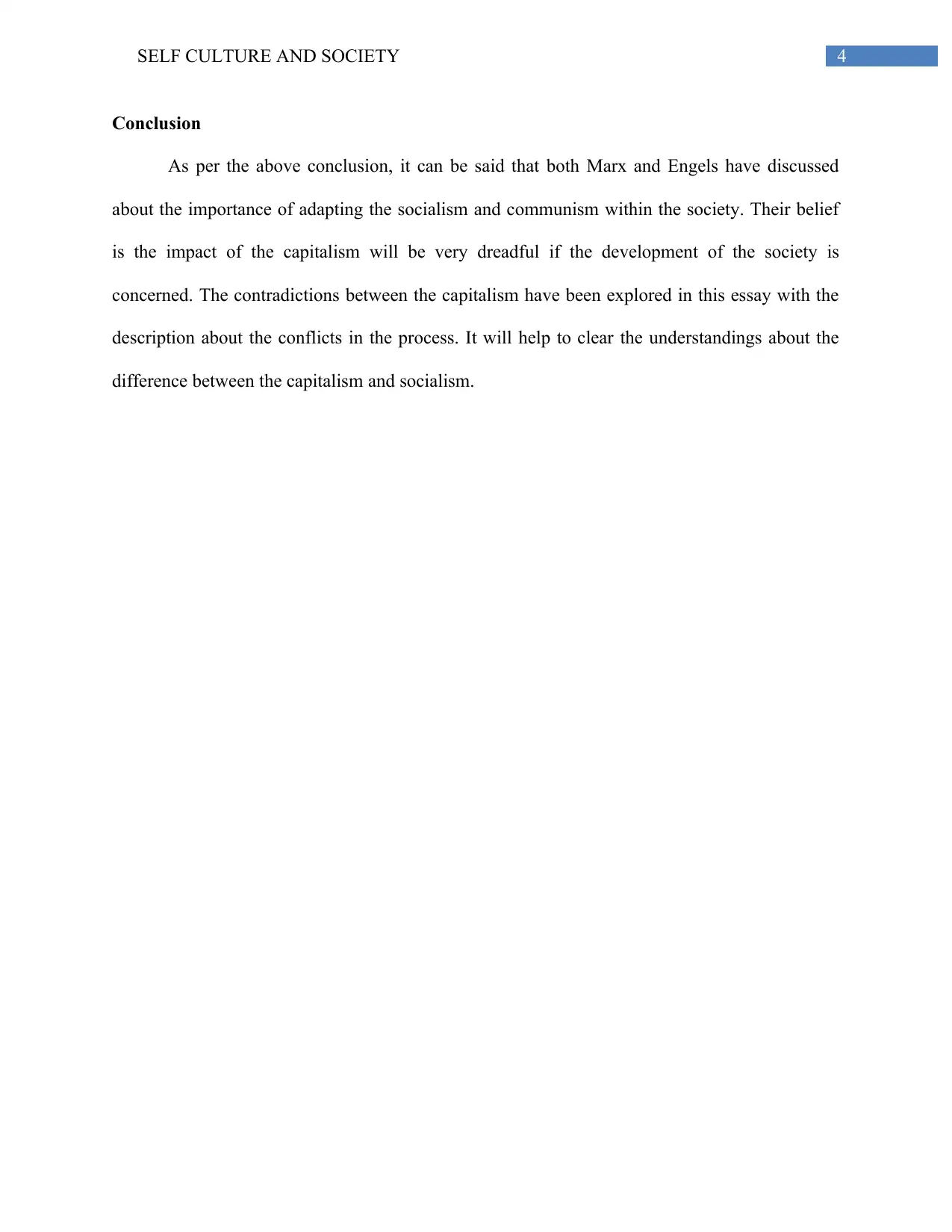
4SELF CULTURE AND SOCIETY
Conclusion
As per the above conclusion, it can be said that both Marx and Engels have discussed
about the importance of adapting the socialism and communism within the society. Their belief
is the impact of the capitalism will be very dreadful if the development of the society is
concerned. The contradictions between the capitalism have been explored in this essay with the
description about the conflicts in the process. It will help to clear the understandings about the
difference between the capitalism and socialism.
Conclusion
As per the above conclusion, it can be said that both Marx and Engels have discussed
about the importance of adapting the socialism and communism within the society. Their belief
is the impact of the capitalism will be very dreadful if the development of the society is
concerned. The contradictions between the capitalism have been explored in this essay with the
description about the conflicts in the process. It will help to clear the understandings about the
difference between the capitalism and socialism.
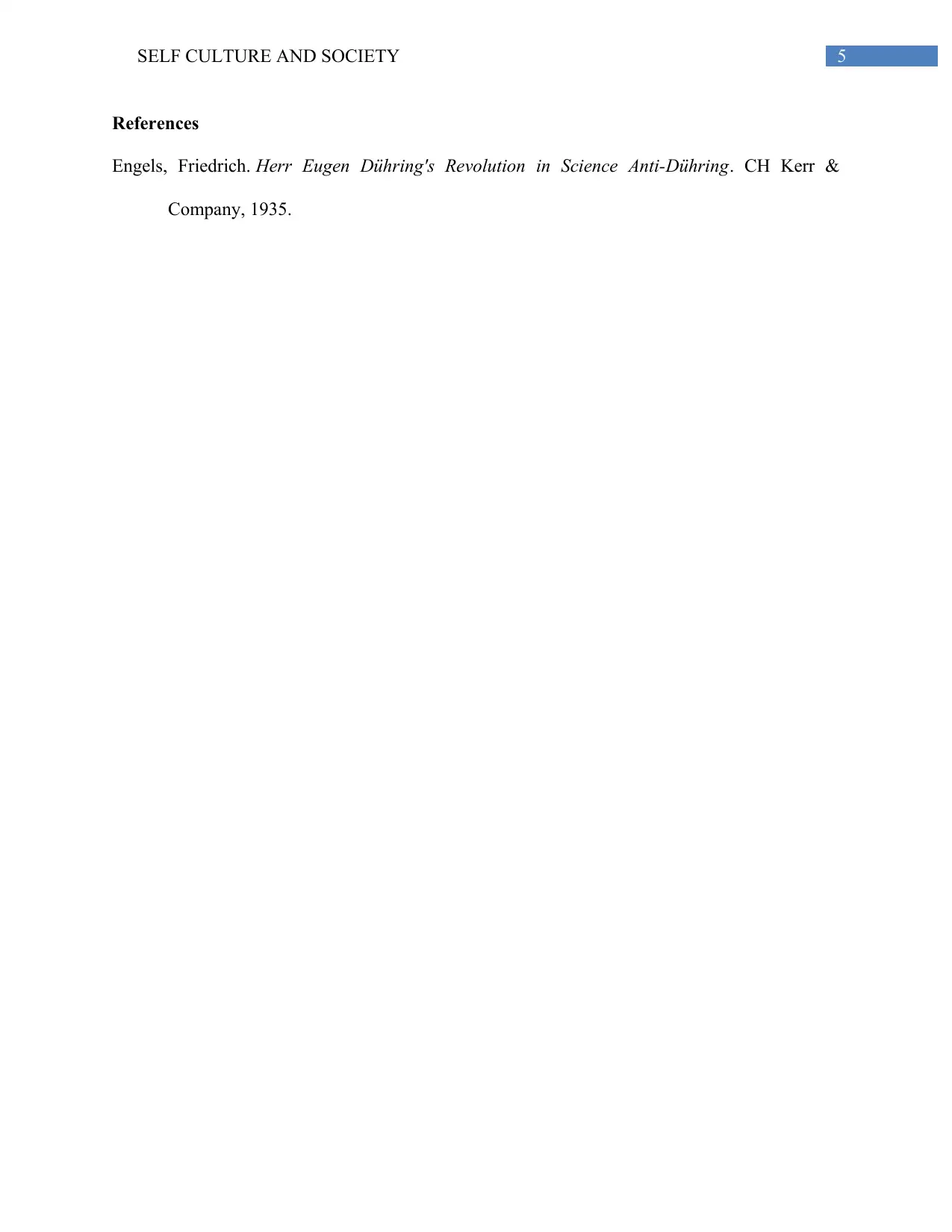
5SELF CULTURE AND SOCIETY
References
Engels, Friedrich. Herr Eugen Dühring's Revolution in Science Anti-Dühring. CH Kerr &
Company, 1935.
References
Engels, Friedrich. Herr Eugen Dühring's Revolution in Science Anti-Dühring. CH Kerr &
Company, 1935.
⊘ This is a preview!⊘
Do you want full access?
Subscribe today to unlock all pages.

Trusted by 1+ million students worldwide
1 out of 6
Related Documents
Your All-in-One AI-Powered Toolkit for Academic Success.
+13062052269
info@desklib.com
Available 24*7 on WhatsApp / Email
![[object Object]](/_next/static/media/star-bottom.7253800d.svg)
Unlock your academic potential
Copyright © 2020–2026 A2Z Services. All Rights Reserved. Developed and managed by ZUCOL.



